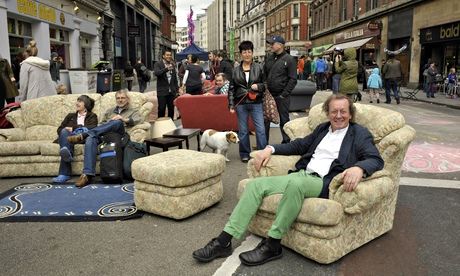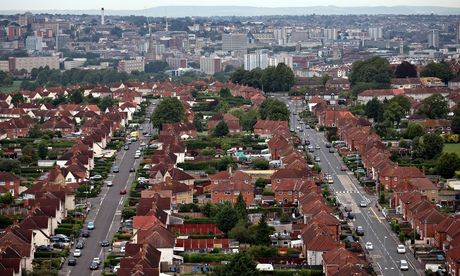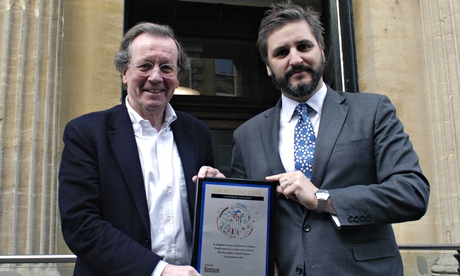 |
| Mayor Ferguson has incurred the wrath of motorists in Bristol due to his support for pedestrianisation and low speed limits. Photograph: London News Pictures/Rex |
Bristol,
as its elected mayor George Ferguson is fond of pointing out, is a city
that likes to do things differently.
One of only a handful of UK cities with an elected mayor, the European Green Capital for 2015, Bristol prides itself on creativity, innovation and sustainability - factors that, presumably, were key to its inclusion as one of Rockefeller Foundation's first tranche of 100 Resilient Cities, a programme intended to help cities "better address the increasing shocks and stresses of the 21st century".
As part of the bid, Bristol committed to developing a resilience plan - the first, tentative formulations of which were discussed at the launch of the city's 100RC project on 4 March.
This workshop event brought together local government, the third sector and infrastructure-related businesses to contemplate the concept of resilience for Bristol.
Longer term, this process will be led by a chief resilience officer - a post funded by Rockefeller - with a mandate to build cross-sector partnerships; the city's strong track record in this kind of partnership working, as evidenced by the successful Green Capital bid, seems to have been another factor in its selection.
I asked Michael Berkowitz, the managing director of Rockefeller's 100 Resilient Cities centennial challenge, about the perennial gripe of urban planners: the limits on a city's ability to act independently, given the boundaries of national legislation, central funding and political mandate.
"In many cases," he conceded, "cities are not in control of their own destiny. In that light, the presence of an elected mayor was a major reason why we chose Bristol as one of our 100 cities."
Ferguson aired a similar complaint. "We go begging to government for the resources we need. Government will answer our immediate needs but not our needs for 2030 or 2040."
The mayor also expressed approval of Boris Johnson's recent calls for greater financial independence for cities - perhaps understandable for the mayors of two wealthy southern cities, if less appealing to those cities needing net subsidy to deal with the social consequences of long-term deprivation.

Bristol is seen as a reasonably affluent city yet its mayor says there are still large inequalities. Photograph: Matt Cardy/Getty Images
Everybody present for the workshop sessions was a professional, managing the city's systems: transport, emergency services, public health, education, social care. Each had been challenged to think about long-term worst-case scenarios.
The litany of risks recalled Burton's Anatomy of Melancholy - "those ordinary rumours of war, plagues, fires, inundations, thefts, murders, massacres, meteors, comets".
Yet far from melancholy, the feeling around the room was something close to relief - there was a buzz of conversation and interest as delegates stepped out of day-to-day constraints to consider the risks that the financial and political limitations of their jobs might normally prevent them from addressing.
Given recent events, flooding could have been expected to dominate discussions. It was briefly mentioned ("we need to start thinking seriously about whether the Somerset Levels are viable as a land mass", said one policymaker, understandably requesting anonymity) but interestingly, social resilience was much more of a hot topic.
Ferguson set the tone by suggesting inequality of life expectancy as a key performance indicator for resilience; even in a wealthy city like Bristol, the richest live nine years longer than the poorest.
Ultimately, a resilient city has to be one in which, in a crisis, people come onto the streets to help one another, not to riot. The profound inequality exposed by life expectancy statistics must be a bad sign in that respect.
Beneath the surface, there were hints of the tensions between short-term politics and a deeper resilience agenda, less amenable to quick fixes - but the battle lines were far from clear.
Ferguson, who has incurred the wrath of Bristol motorists by supporting 20mph speed limits and residential parking restrictions, spoke passionately in response to a question from Ian Barratt of Sustrans about resilient transport. "People fear change in the transport system, but when they see it, they will get it."
The council has also faced criticism from Bristol's local food campaigners, who are fighting to save some of the best food-producing soil in the south-west from plans for an M32 park and ride - a campaign backed by Joy Carey, whose report, Who Feeds Bristol? (pdf), was in turn namechecked by the council's sustainable city group manager, Alex Minshull, in his workshop presentation.
Some council delegates were discreetly frank about the complex relationship between local authorities and campaigners. "I like it when people make those arguments," one admitted. "They can say the things I'm not allowed to say."
Perhaps no city can escape the demands of contemporary lifestyles. As one delegate pointed out, 75% of food eaten in Bristol comes from a supermarket, and Bristol has the worst car congestion of any core city in Britain.
In a system which, for all its democratic shortfalls, remains driven by public opinion, can any planner do anything except facilitate the car and supermarket way of life - even when the vulnerabilities of that model are staring them in the face?

The mayor of Bristol, George Ferguson (l), with 100 Resilient Cities managing director, Michael Berkowitz. Photograph: Guardian Cities
Ian Roderick, of the Schumacher Institute, acknowledged this reality. "There is no immediate benefit to long-term thinking."
And Michael Berkovitz was clear about the need for greater public awareness of the resilience agenda. "We're going to have to talk in very blunt ways about the risks that we face. But we have to choose our moments; when there's a flood, we talk about flooding. When there's a power cut or a fuel stoppage, that's the time to talk about energy."
It remains to be seen whether Bristol can successfully generate this broader public conversation. But the delegates seemed convinced. David White, the council's Green Deal technical officer, expressed his excitement about the day. "Working in Liverpool was a very different experience. In Bristol all this stuff is right at the top of the agenda."
One of only a handful of UK cities with an elected mayor, the European Green Capital for 2015, Bristol prides itself on creativity, innovation and sustainability - factors that, presumably, were key to its inclusion as one of Rockefeller Foundation's first tranche of 100 Resilient Cities, a programme intended to help cities "better address the increasing shocks and stresses of the 21st century".
As part of the bid, Bristol committed to developing a resilience plan - the first, tentative formulations of which were discussed at the launch of the city's 100RC project on 4 March.
This workshop event brought together local government, the third sector and infrastructure-related businesses to contemplate the concept of resilience for Bristol.
Longer term, this process will be led by a chief resilience officer - a post funded by Rockefeller - with a mandate to build cross-sector partnerships; the city's strong track record in this kind of partnership working, as evidenced by the successful Green Capital bid, seems to have been another factor in its selection.
I asked Michael Berkowitz, the managing director of Rockefeller's 100 Resilient Cities centennial challenge, about the perennial gripe of urban planners: the limits on a city's ability to act independently, given the boundaries of national legislation, central funding and political mandate.
"In many cases," he conceded, "cities are not in control of their own destiny. In that light, the presence of an elected mayor was a major reason why we chose Bristol as one of our 100 cities."
Ferguson aired a similar complaint. "We go begging to government for the resources we need. Government will answer our immediate needs but not our needs for 2030 or 2040."
The mayor also expressed approval of Boris Johnson's recent calls for greater financial independence for cities - perhaps understandable for the mayors of two wealthy southern cities, if less appealing to those cities needing net subsidy to deal with the social consequences of long-term deprivation.

Bristol is seen as a reasonably affluent city yet its mayor says there are still large inequalities. Photograph: Matt Cardy/Getty Images
Everybody present for the workshop sessions was a professional, managing the city's systems: transport, emergency services, public health, education, social care. Each had been challenged to think about long-term worst-case scenarios.
The litany of risks recalled Burton's Anatomy of Melancholy - "those ordinary rumours of war, plagues, fires, inundations, thefts, murders, massacres, meteors, comets".
Yet far from melancholy, the feeling around the room was something close to relief - there was a buzz of conversation and interest as delegates stepped out of day-to-day constraints to consider the risks that the financial and political limitations of their jobs might normally prevent them from addressing.
Given recent events, flooding could have been expected to dominate discussions. It was briefly mentioned ("we need to start thinking seriously about whether the Somerset Levels are viable as a land mass", said one policymaker, understandably requesting anonymity) but interestingly, social resilience was much more of a hot topic.
Ferguson set the tone by suggesting inequality of life expectancy as a key performance indicator for resilience; even in a wealthy city like Bristol, the richest live nine years longer than the poorest.
Ultimately, a resilient city has to be one in which, in a crisis, people come onto the streets to help one another, not to riot. The profound inequality exposed by life expectancy statistics must be a bad sign in that respect.
Beneath the surface, there were hints of the tensions between short-term politics and a deeper resilience agenda, less amenable to quick fixes - but the battle lines were far from clear.
Ferguson, who has incurred the wrath of Bristol motorists by supporting 20mph speed limits and residential parking restrictions, spoke passionately in response to a question from Ian Barratt of Sustrans about resilient transport. "People fear change in the transport system, but when they see it, they will get it."
The council has also faced criticism from Bristol's local food campaigners, who are fighting to save some of the best food-producing soil in the south-west from plans for an M32 park and ride - a campaign backed by Joy Carey, whose report, Who Feeds Bristol? (pdf), was in turn namechecked by the council's sustainable city group manager, Alex Minshull, in his workshop presentation.
Some council delegates were discreetly frank about the complex relationship between local authorities and campaigners. "I like it when people make those arguments," one admitted. "They can say the things I'm not allowed to say."
Perhaps no city can escape the demands of contemporary lifestyles. As one delegate pointed out, 75% of food eaten in Bristol comes from a supermarket, and Bristol has the worst car congestion of any core city in Britain.
In a system which, for all its democratic shortfalls, remains driven by public opinion, can any planner do anything except facilitate the car and supermarket way of life - even when the vulnerabilities of that model are staring them in the face?

The mayor of Bristol, George Ferguson (l), with 100 Resilient Cities managing director, Michael Berkowitz. Photograph: Guardian Cities
Ian Roderick, of the Schumacher Institute, acknowledged this reality. "There is no immediate benefit to long-term thinking."
And Michael Berkovitz was clear about the need for greater public awareness of the resilience agenda. "We're going to have to talk in very blunt ways about the risks that we face. But we have to choose our moments; when there's a flood, we talk about flooding. When there's a power cut or a fuel stoppage, that's the time to talk about energy."
It remains to be seen whether Bristol can successfully generate this broader public conversation. But the delegates seemed convinced. David White, the council's Green Deal technical officer, expressed his excitement about the day. "Working in Liverpool was a very different experience. In Bristol all this stuff is right at the top of the agenda."
No comments:
Post a Comment